Donald Trump and J.D. Vance PACs raked in millions from gas industry megadonors Karen Buchwald Wright and Thomas Rastin
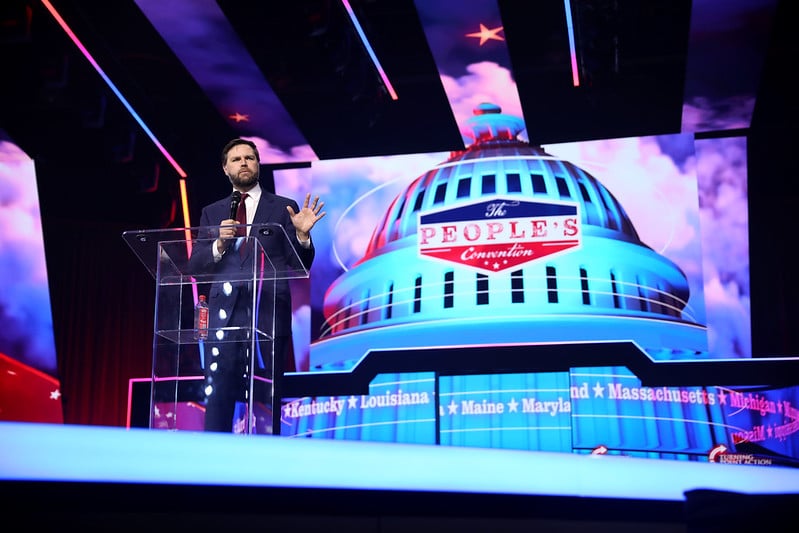
Ariel Corporation chairman and her spouse have also opposed new solar farms in Ohio
Gas industry megadonor couple Karen Buchwald Wright and Thomas Rastin together contributed at least $2.4 million to political committees that supported Donald Trump and J.D. Vance in the last three election cycles.
Wright and Rastin, whose family owns the Ohio-based methane gas (also known as natural gas) compressor manufacturer Ariel Corporation, are Republican megadonors who since 1996 have made millions of dollars in federal campaign contributions. Wright retired as CEO of Ariel Corp. in 2021, and is now chairman of the company. Rastin was the company’s executive vice president before he retired.
The $2.4 million total does not include nearly $225,000 spent to support Vance’s campaign for U.S. Senate by a Super PAC established by The Empowerment Alliance (TEA), a gas industry dark money group backed by Wright and Rastin. Funding for TEA’s Super PAC, dubbed the Affordable Energy Fund, was routed through a network of murky nonprofit and for-profit entities that obscured the money’s origins.
Wright, Rastin, and TEA have opposed the construction of new solar farms in Ohio, as detailed in earlier reports by the Energy and Policy Institute and Energy News Network. Rastin and TEA also pushed through misleading state legislation that redefined methane gas, a fossil fuel and potent source of harmful greenhouse gas pollution that causes climate change, as “green energy” under Ohio law.
TEA often portrays renewable energy as part of a communist takeover conspiracy by China. China and Russia are two of the largest markets for Ariel Corp.’s products, according to a company website.
Wright and Rastin contributed $2.15 million to the Trump Victory fund and pro-Trump America First Action between 2016 and 2020
Wright and Rastin made a dozen contributions totaling $1.15 million to the Trump Victory PAC in 2016-2020. The couple also contributed $1 million to America First Action, a pro-Trump Super PAC, in 2018 and 2019.
In April of 2018, Wright and Rastin attended a secretly recorded dinner with then-President Trump for donors to America First Action. As OpenSecrets previously reported:
Donors involved in the natural gas compression industry, which Buchwald Wright and Rastin are part of, also had a candid dialogue with Trump about what changes are best for their bottom line, like relying less on renewable energy sources, lowering emission regulations and the need for new refineries. In response, Trump told them his administration is planning to roll back emission standards.
Rastin also pushed Trump to support the manufacture of compressed methane gas vehicles. Later that year, Ariel Corporation backed gas industry efforts to extend federal support for electric vehicles to vehicles fueled by methane gas.
TEA has been publicly supportive of Trump and Vance during the current election cycle.
“Donald Trump is the greatest communicator of the modern political era,” TEA said in one X post last year that included a video where Trump described oil and gas as “liquid gold” and maligned wind and solar power.
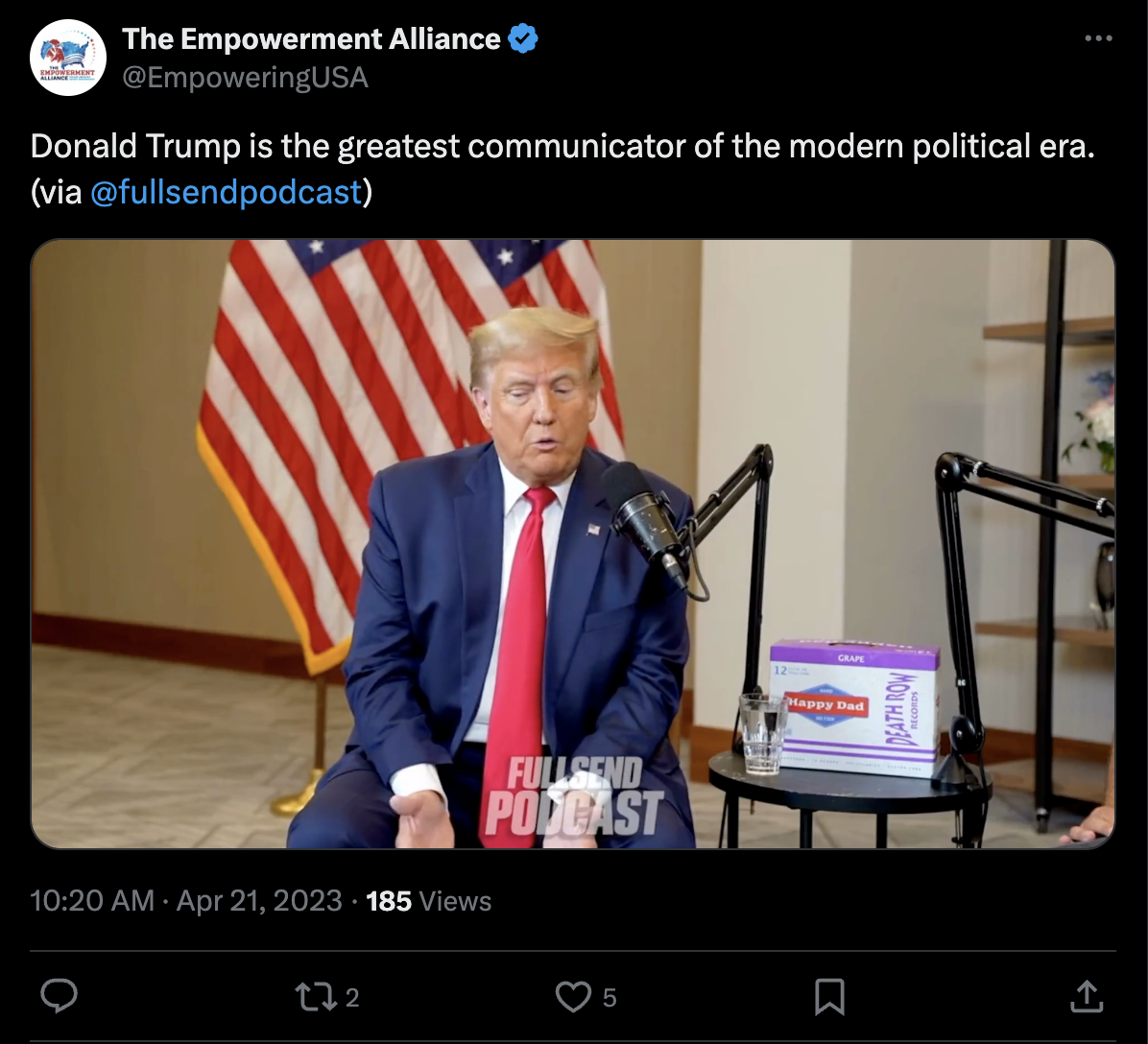
TEA has regularly attacked President Joe Biden, and more recently has turned to targeting the Democratic Party’s current candidates for president and vice president, Kamala Harris and Tim Walz.
Wright contributed $250,000 to a Super PAC that promoted Vance’s early political attacks labeling Democrats as “Childless Liberals”
Wright contributed $250,000 in 2022 to Protect Ohio Values, a Super PAC that spent $14.5 supporting Vance’s bid for a U.S. Senate seat, and nearly $1.3 opposing his Republican primary opponent Josh Mandel. The pro-Vance Super PAC is better known publicly for the $15 million it received from venture capitalist Peter Thiel during Vance’s first major political campaign.
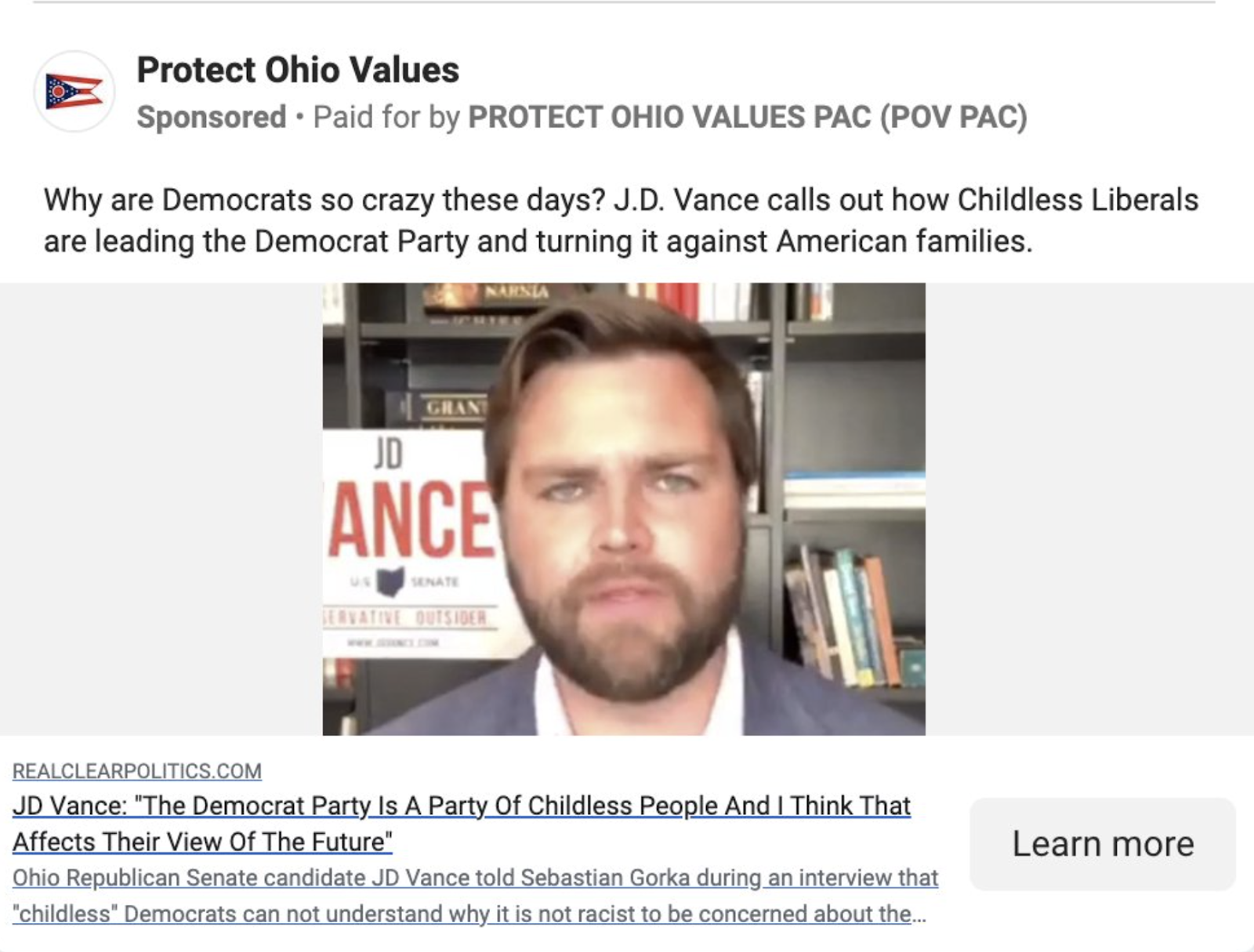
In 2021, Vance described Democrats as “childless people” during an interview with Sebastion Gorka on the America First podcast. The Protect Ohio Values PAC then used Vance’s attack in its political advertising.
Vance’s 2022 campaign for U.S. Senate benefited from outside support from a murky Super PAC established by Wright and Rastin’s dark money group
A Super PAC called the Affordable Energy Fund spent over $1 million supporting Republican candidates in Ohio during the 2022 elections, including nearly $225,000 spent supporting Vance’s Senate campaign.
The Affordable Energy Fund was established by The Empowerment Alliance, according to a copy of TEA’s “Year in Review” report for 2021. TEA planned to expand its reach to all the critical battleground states by 2024. The Energy and Policy Institute obtained the report through a public records request to county commissioners in Ohio’s Auglaize County who met with a representative of TEA in 2022.
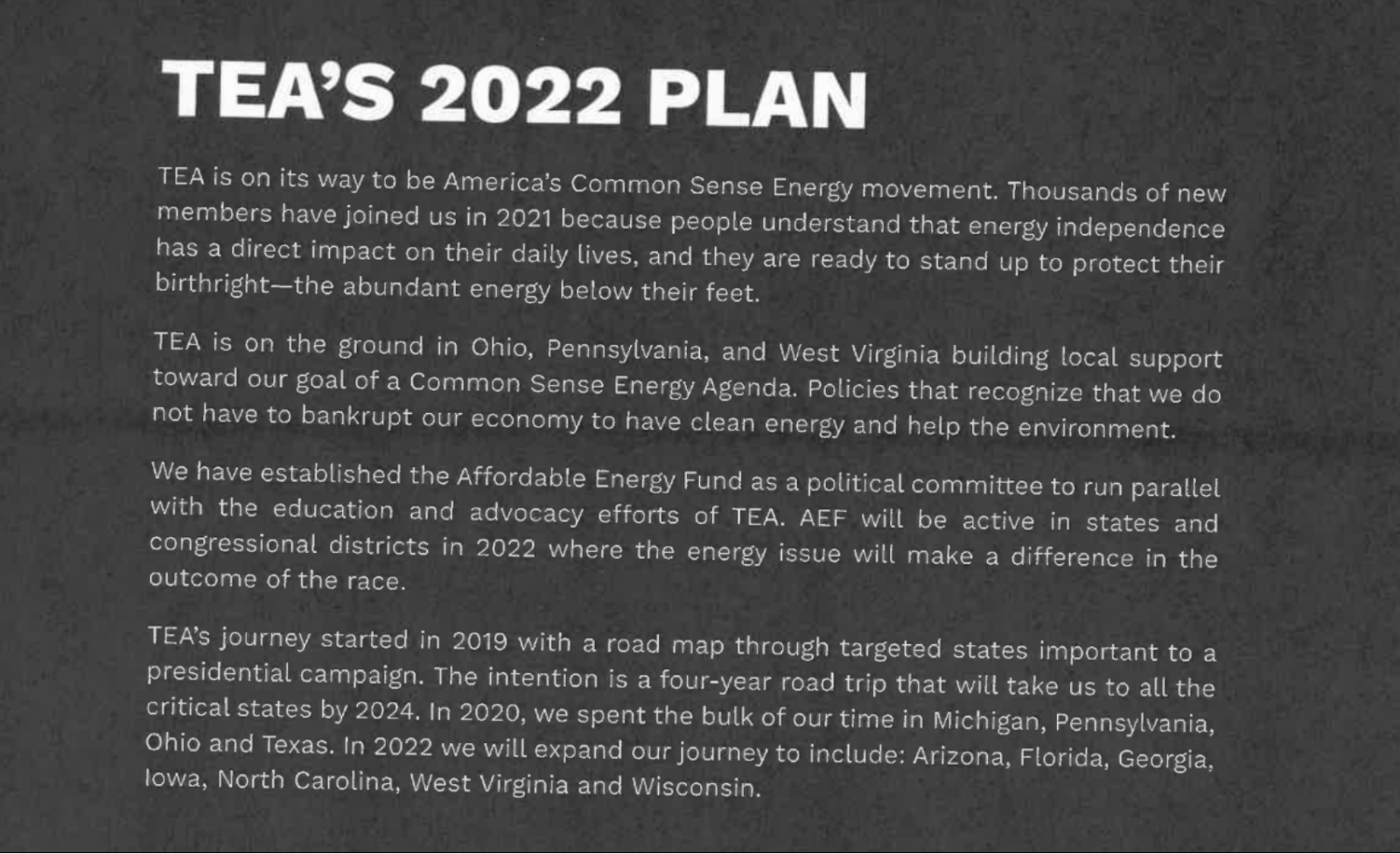
TEA is registered with IRS as a 501(c)(4) tax-exempt social welfare organization, a class of non-profits often described as dark money groups because 501(c)(4) organizations can engage in political activities, including spending money to support or oppose candidates for public office, without being required to disclose their donors to the public.
Wright and Rastin’s behind-the-scenes role in TEA was first revealed in an event description for a 2021 virtual conference hosted by the right-leaning National Review Institute, where the couple spoke about “their new project The Empowerment Alliance.” Emails obtained by the Energy and Policy Institute later showed Rastin communicating with Ohio state lawmakers on behalf of TEA, demonstrating his close personal involvement in the group’s operations.
Rastin and Wright’s names have not appeared on lists of TEA’s officers included in publicly available copies of the group’s annual Form 990 reports to the IRS. Mitch Given, TEA’s Ohio Director, described Rastin as a “major supporter” in a meeting with commissioners in another Ohio county last year.
Longtime GOP fundraiser Brooke Bodney has been listed on the tax reports as TEA’s president since 2019, the year when TEA was launched. At the time, Bodney was also a top paid fundraiser for the political operation of Ohio House Speaker Larry Householder, who would later be convicted of racketeering in connection with $60 million in bribes paid by the utility FirstEnergy.
Evidence presented by prosecutors at Householder’s trial showed Wright contributed $250,000 in 2018 to Householder’s 501(c)(4) Generation Now, which pleaded guilty to racketeering in the Householder case. Neither Bodney nor Wright have been charged with any crime in the ongoing federal criminal investigation.
Bodney was paid $575,000 by Householder’s political operation between 2017 and 2020.
It is unclear from publicly available records how much of the $1 million raised by the Affordable Energy Fund PAC during the 2022 election came from Wright or Rastin. The Super PAC raised most of its money from 501(c)(4) organizations that do not disclose their donors, including the American Exceptionalism Institute and Prosperity Alliance.
$155,000 of the Affordable Energy Fund PAC’s funding came from Affordable Energy LLC, a murky for-profit entity. Another 501(c)(4) organization named One Ohio United later reported to the IRS that it paid $1.25 million to “AEF LLC” in 2022.
One Ohio United is also the only known entity that has publicly reported making contributions to TEA. Laura Bates, the president of One Ohio United, is the finance director for the Ohio Republican Party.
During Householder’s trial, prosecutors described how One Ohio United had previously served as a pass-through used to help obscure the money trail between FirstEnergy and a Super PAC that supported Householder during the 2018 elections.
“In terms of energy, Trump could not have picked a better running mate — one who will help embrace a common sense agenda focused on affordable, reliable clean American energy,” TEA said of Vance last month in a newsletter.
“Sen. Vance is a strong advocate for domestic natural gas and oil production and opposes electric vehicles and solar power,” the newsletter also said.
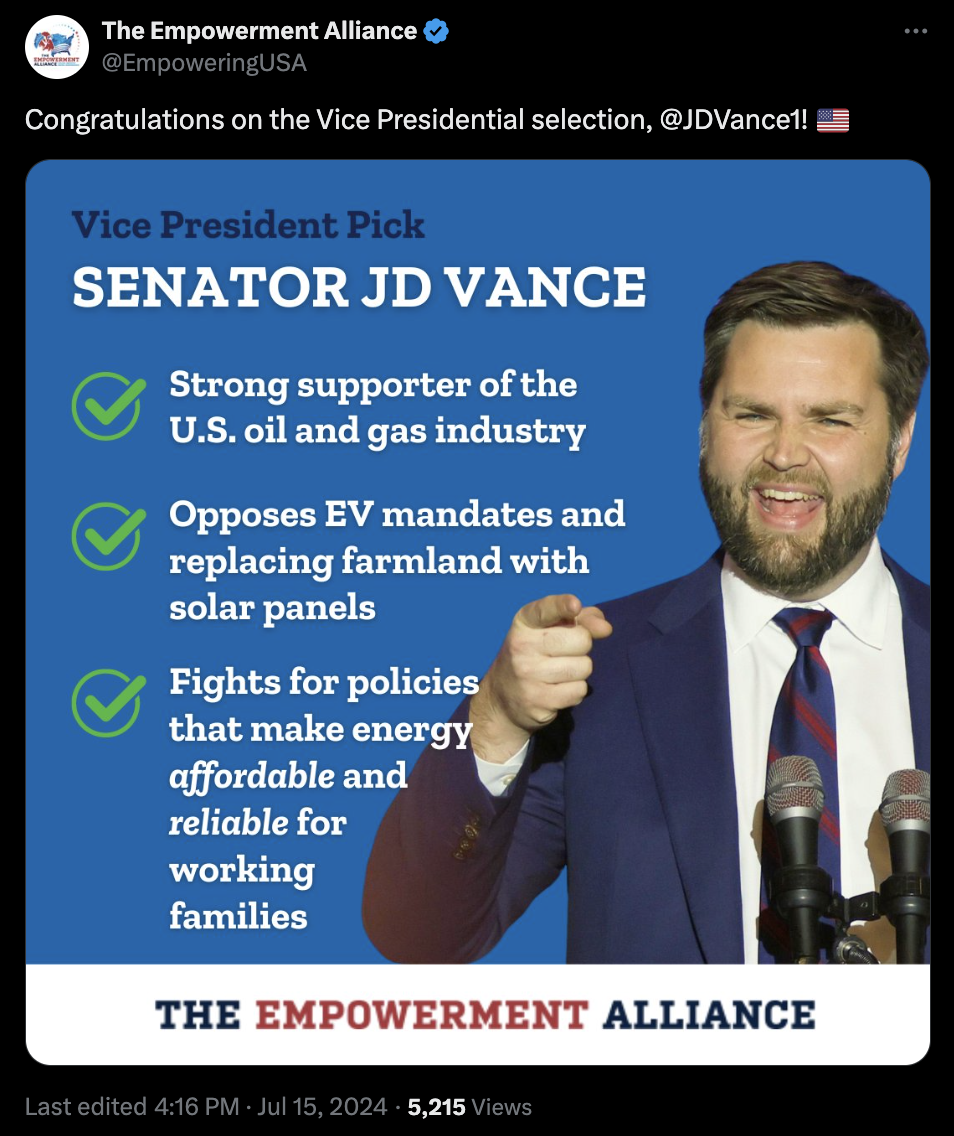
TEA celebrated Trump’s selection of Vance as his VP candidate on social media
“They do great work,” Vance said when asked by the U.S. Oil and Gas Association (USOGA) if he followed TEA, according to a X post from July by the fossil fuel industry group.
The post did not explain when USOGA’s conversation with Vance took place.
Election mailers sent out by the Affordable Energy Fund during the 2022 election described gas as clean, affordable, and reliable energy. In reality, electricity price increases in 2022 were fueled by increases in the cost of coal, gas, and oil.
The midterm elections that year also came on the heels of 2021’s Winter Storm Uri, which resulted in a widespread power blackout and suffering in Texas caused primarily by failures of the state’s gas system. TEA has tried to blame the Texas blackouts on renewable energy.
Vance tweeted a few months after the storm that he’d signed onto TEA’s Declaration of Energy Independence, which described gas as clean energy.
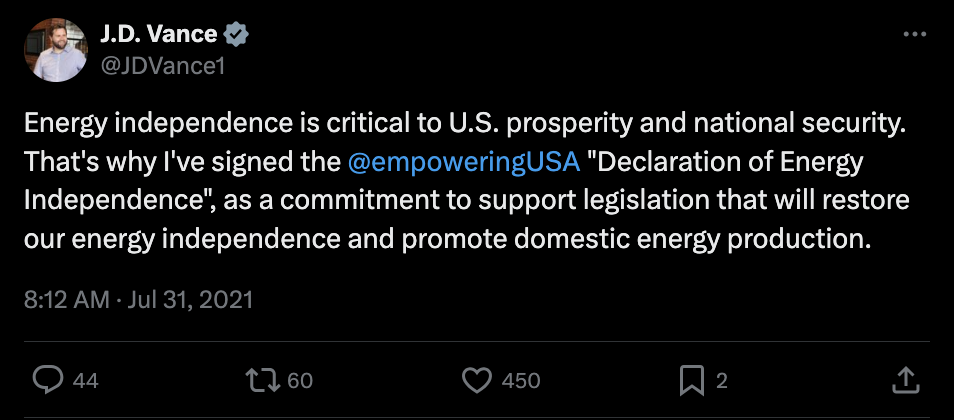
Vance recognized climate change as a problem during a 2020 speech at the Ohio State University, where he touted solar as part of the solution, as FastCompany previously reported.
Vance also said during that speech that gas “isn’t exactly the sort of thing that’s gonna take us to a clean energy future,” according to Rolling Stone.
He later flip-flopped from being a renewable energy supporter to an outspoken opponent as money from the oil and gas industry flowed into the Super PACs that supported his U.S. Senate campaign.
Top photo of J.D. Vance speaking at Turning Point Action’s The People’s Convention in Detroit, Michigan by Gage Skimore. Source: Shutterfly. Attribution-ShareAlike 2.0 Generic License.



